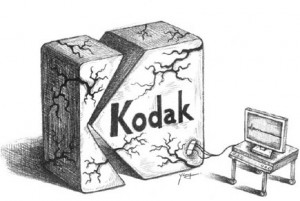Creative Destruction
 One of the things I wanted to cover in my series of articles concerning Jeff Bezos and Amazon.com is the process of creative destruction. Have you ever heard of “creative destruction”? It’s a term that was originally used by an Austrian economist, Joseph Schumpeter (1883–1950). Schumpeter described creative destruction as an essential process that takes place in a free-market economy, wiping out entire industries after new technologies are discovered and put into place.
One of the things I wanted to cover in my series of articles concerning Jeff Bezos and Amazon.com is the process of creative destruction. Have you ever heard of “creative destruction”? It’s a term that was originally used by an Austrian economist, Joseph Schumpeter (1883–1950). Schumpeter described creative destruction as an essential process that takes place in a free-market economy, wiping out entire industries after new technologies are discovered and put into place.
Schumpeter explained that in a free-market capitalist economy, it is inevitable that as new products, services, and opportunities are created by entrepreneurs, companies and industries that are locked into the old way of doing business quickly vanish, causing the people in those industries to lose their jobs.
Over time, the concept of creative destruction has been used by free-market economists to explain how societies can become more productive, benefit from better products and services, and enjoy a higher standard of living. The dark side of creative destruction is that there are always large groups of individuals who end up being worse off because of the loss of jobs associated with the companies that were involved in the old way of doing business.
Here are some examples of creative destruction:
• The invention of the automobile created new jobs for designers, assemblers, road construction workers, mechanics, and truck drivers, while wiping out the horse-and-carriage industry and large segments of the train and boat industries. There were massive job losses among blacksmiths, wainwrights (makers and repairers of wagons), drovers (cattle and sheep drivers), railroad workers, and canalmen.
• The invention of plastics created new jobs for petrochemists and factory workers, while eliminating or severely curtailing companies that manufactured steel, aluminum, barrels, tubs, pottery, and glass. There were massive job losses among miners, founders, metalworkers, coopers, and potters.
• The invention of the computer created new jobs for programmers, computer engineers, electrical engineers, and software developers, while eliminating or severely curtailing industries that produced typewriters, adding machines, slide rules, paper, and filing cabinets. There were massive job losses among factory workers (who were replaced by computer-operated robots and machinery), clerical workers, tinsmiths, and lumberjacks.
• The invention of the Internet created new jobs for programmers, network operators, webmasters, and software developers, while eliminating or severely curtailing retail stores, printing companies, map companies, insurance agencies, professional practices, and companies that produced reference books. There were massive job losses among retail salespersons; insurance agents; tax preparers; transaction attorneys; librarians; and Yellow Pages, book, and encyclopedia salespersons.
In addition to the above, inventions related to agriculture, electricity, photography, telephones, airplanes, fax machines, email, and smartphones also led to the destruction of jobs in the industries that were replaced by the new technologies.
In the early 1900s, the U.S. had 2,076,000 railroad workers and 11,533,000 farm workers. Now, we have 111,000 railroad workers and 716,000 farm workers. Since then, there have also been substantial job losses in other industries, including machine operators, watchmakers, telephone operators, and secretaries.
In the early 1900s, there were no auto mechanics, medical technicians, electricians, webmasters, or taxi, bus, and truck drivers. Today, we have more than 867,000 auto mechanics, 1,879,000 medical technicians, 882,000 electricians, 500,000 webmasters, and 4,171,000 taxi, bus, and truck drivers. Since then, there has also been a substantial increase in the number of engineers, computer operators, computer programmers, scientists, teachers, physicians, and pharmacists.
The U.S. Postal Service is currently losing billions of dollars every year because the preferred forms of written communication are now email, texting, and social media. Fifteen years ago, the telephone book was a necessary item in every home. Now it’s obsolete.
So what has creative destruction done for our country over the past 100 years? It has ushered in a significantly higher standard of living for everyone. Even poor people in our country enjoy a higher standard of living than more than 90 percent of the rest of the world. Yet there are millions of people in the U.S. who are demanding that the politicians put a stop to the process of creative destruction.
While there is often an immediate and massive loss of jobs when a new technology is put into place (e.g., the Internet), the long-term payoff from the new technology usually significantly outweighs the short-term losses.
Because of the trauma caused by creative destruction, many of the people who have been adversely affected demand that the politicians tax and regulate the people and industries that are in the best positions to create new technologies. Can we trust our politicians to come up with a better way of managing our economy than the free-market system that has been in place ever since the founding of our country?
These are the same politicians who promoted and allowed the corporatists* to outsource millions of American jobs overseas. They’re the same politicians who are incapable of running the Veterans Administration and almost every other department in the government. And they’re the same politicians who are now allowing illegal immigrants to flood into our country to work for substandard wages, so that they and the corporatists can secure greater benefits and profits for themselves.
Commenting on the tendency of people to want to put a halt to creative destruction, Joseph Schumpeter said, “Societies that try to reap the gain of creative destruction without the pain find themselves enduring the pain but not the gain.”
We need to be careful what we hope for. I believe that it was by Divine Providence that our Founding Fathers wrote the Declaration of Independence and established the United States Constitution. Both of these documents helped to create the greatest free-market economy the world has ever seen.
Unfortunately, over the past 100 years, individuals who are in charge of our federal government and the multinational corporations have transformed our economy into a corrupt system that benefits them at the expense of American citizens. We need to put an end to their corrupt practices, not our free-market economic system.
*When I refer to “corporatists,” I’m not talking about the entrepreneurs — the men and women who seek to serve others by creating better products and services. I’m talking about the men and women who are in charge of the multinational corporations. These people have no loyalty or allegiance to America or its citizens.




3 Comments
Harry,
Thanks for explaining “Creative Destruction”. I have been talking with friends about similar ideas. I didn’t know there was a term for this. Being in Agriculture, I see the pain side quite clearly. I understand that great things have also come along to streamline Agriculture as well.
One question: Would you consider Walmart, Costco, or some other large chain store as Creative destuction?
I look forward to your response.
Rich
Rich,
The answer to your question about Walmart, Costco, etc., is yes. Sam Walton started with a small hardware store in Arkansas and was able to use new technologies combined with his own creativity to systematize all the processes involved in the business and expand his business to what eventually became the Walmart empire. He then created Sam’s Club which was later copied by Costco.
Walton was very competitive. His ultimate goal was to pass up K-Mart in total sales. He accomplished his goal and in the process, virtually destroyed K-Mart which was later sold to Sears. There is still a place for the local small business, but if such a business is to prosper and grow, the owner must become an expert at sales and marketing.
If you’re helping out a local business, I would suggest you start by reading the book, “No B.S. Grassroots Marketing: The Ultimate…” by Dan Kennedy and Jeff Slutsky.
Take care,
Harry
DEAR HARY AND GEORGETTE –
I HAVE LOTS OF CATCHING UP TO DO – AM BEHIND IN READING [AND RESPONDING TO] EMAILS AND SUCH AS YOUR WEEKLY GEMS. THERE IS ONE MORE TO READ – THE AUGUST 10TH ONE.
FOR THIS ONE ON CREATIVE DESTRUCTION IS WELL DONE, AS USUAL! YOU HAVE A WAY OF DESCRIBING AND EXPLAINING THAT IS CLEAR AND TO THE POINT! THE DESTRUCTION THAT IS ALREADY WELL ON ITS WAY IS THE MIS-USE AND OVER-USE OF TEXTING. I’M NOT REFERRING TO “WHILE DRIVING”, WHICH IS AN EVIL IN ITSELF – – THE NEED TO COMMUNICATE CONSTANTLY THAT IS DESTROYING THE CONVERSATION-ABILITY, THE HANDWRITING-ABILITY,
AND SUCH, ESPECIALLY WITH OUR YOUTH WHO HAVE NOT EXPERIENCED WHAT IT’S LIKE TO PLAY “FAMILY GAMES”, GUESSING GAMES AND SUCH…. THEY
ARE DEPRIVED OF THESE EXPERIENCES, AND SO WILL NOT BE ABLE TO SHOW THEIR OWN CHILDREN HOW… WITH LOVE TO YOU! SISTER ROBERTA